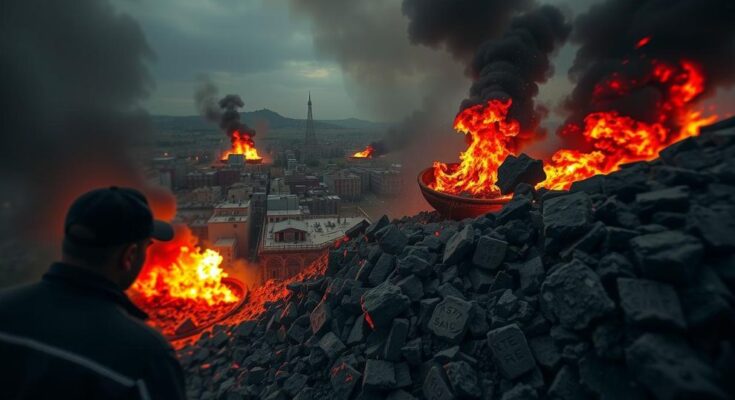The ceasefire between Israel and Hezbollah is under strain following recent exchanges of fire, including Israeli air strikes in response to Hezbollah’s mortar attack. Despite the fragile agreement, both sides accuse one another of violations, prompting urgent calls for effective international monitoring. Political leaders underscore the need for dialogue and adherence to the ceasefire terms to prevent further escalation of conflict.
Recent exchanges of fire between Israel and Hezbollah are raising concerns over the durability of a ceasefire agreement established just last week. Following Hezbollah’s shelling of an Israeli military position, Israel executed its most extensive air strikes since the truce’s inception, resulting in the deaths of at least nine individuals in southern Lebanon. This situation underscores the fragile nature of the ceasefire, which was facilitated by the United States and France to maintain peace as both sides accuse each other of violating its terms. Under the ceasefire, Israel is restricted from offensive operations in Lebanon while Lebanon is tasked with preventing Hezbollah and other groups from threatening Israel.
Israeli officials maintain that their military responses are justified, arguing that Hezbollah’s recent actions prompted necessary defensive measures. Prime Minister Benjamin Netanyahu has pledged a forceful reaction to any aggression, while Defense Minister Israel Katz warned that the ceasefire would not provide protection to Lebanon should fighting resume. In contrast, Hezbollah asserts that its retaliatory strike was a defensive maneuver aimed at responding to Israeli violations of the ceasefire, highlighting that previous appeals to halt these actions have been largely ignored.
Political analysts and Lebanese officials emphasize the urgent need for effective international oversight of the ceasefire to prevent escalation. A monitoring committee, co-chaired by U.S. General Jasper Jeffers and White House advisor Amos Hochstein, aims to facilitate dialogue and verify claims of violations, with representatives from both Lebanon’s military and the United Nations present. Observers remain cautious but note a significant reduction in armed conflict following the ceasefire, stressing the ongoing requirement for sustained diplomatic efforts to preserve peace in the region.
The recent clashes between Israel and Hezbollah are set against the backdrop of a precarious ceasefire brokered by international powers to manage long-standing tensions. Hezbollah’s positioning and responses to Israeli military operations are seen as critical factors in the stability of this agreement. Historically, exchanges of fire between these two entities are not uncommon, contributing to a complex regional conflict that has drawn the attention of global powers seeking to mediate peace. The ceasefire seeks to halt immediate hostilities but leaves open challenges related to adherence and enforcement, further complicating peace efforts.
In conclusion, the fragile ceasefire between Israel and Hezbollah is currently being tested by ongoing military exchanges, with both parties blaming each other for violations. The situation underscores the need for effective international oversight to prevent further escalation. Political leaders emphasize that the responsibility for maintaining peace lies heavily on diplomatic channels and adherence to the ceasefire agreements, revealing the delicate balance of power in the region.
Original Source: www.bbc.co.uk




